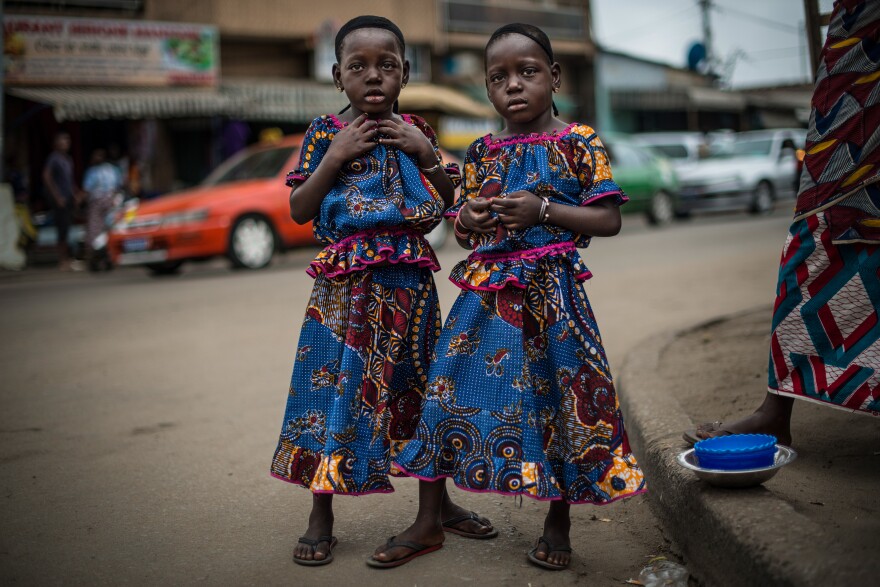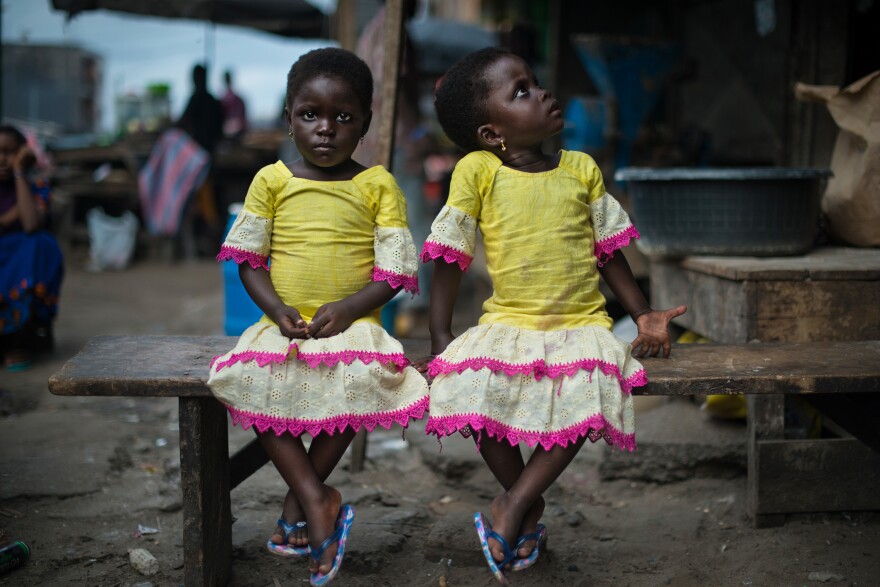As Armenian photographer Anush Babajanyan wandered through the streets of Abidjan, Ivory Coast, she encountered something she found a bit strange. "I was walking with a friend of mine in the city's central district," she says. "And we started to see twins everywhere."

As they approached the big mosque in town, she saw more and more of them — congregations of twins, milling about the streets. Most of them were very young children, accompanied by their mothers. "And they were playing — with each other and their mothers."
Every now and then, passers-by would stop to give the kids some money.
"I started to ask around to try to understand," Babajanyan says. "And that's when I found out the twins were giving a blessing to those who gave them money."

In parts of West Africa, people believe that twins have mystical powers. "It is believed that they can make a wish come true," Babajanyan explains. Intrigued, she hired a French-speaking fixer and went back to find the twins and their mothers. "I just talked with them for a long time, and I made portraits of those who agreed," she says.
The resulting series is a bit of a departure from her other work. Babajan has dedicated most of her career to documenting life in the Caucasus — and recently, she's been dedicated to documenting the peace-building processes between Armenia and Turkey.
We spoke with the 34-year-old freelance photographer about what attracts her lens, and drives her as a photographer. The interview has been edited for length and clarity.

Tell us a more about your Twins project. Were the young twins shy around the camera, or were they used to being the center of attention?
I would not say the children were used to cameras. In a couple of cases, they would start to cry as soon as they saw me take it out. Of course, to them, I'm a total stranger — so before I even asked to take their photo, I would spend a lot of time just hanging out with them and their mothers. I would play around with them. And then, after a while, if they were comfortable, I would take some pictures.
Did the kids think they possessed magical powers?
It's hard to really understand to what extend the children think of themselves as mystical beings. For them, all of this was something ordinary and natural — they'd been coming out to the street for a long time.
As for the people giving them money, I think different people approached with different ideas in mind. But for most of them, they maybe hoped for the best, but more than anything I think they were just honoring this old tradition. Best case, their wish comes true. But even if it doesn't, there's nothing bad to come out of this — and at the least they're helping the children.

Did you feel the kids were being exploited at all?
The children weren't working as such, they were just playing around. And they weren't there for the whole day — so it wasn't necessarily that this affected their education at all. Actually, many of the kids I saw out there were too young for school. Ultimately, this activity fed them — and twins actually will be able to earn a living for the whole family. So I cannot judge these mothers for bringing them to the street.
Have you been back to Abidjan since taking these portraits last year?
No, but I really want to go back and visit the children!
There was a small exhibition I set up in Abidjan before I left, and I told the families where it was, and that they should go and see their portraits. I hope at least some of them went.

For most of your career, you've had your lens trained on the Caucasus — highlighting the aftermath of territorial conflict and war. How does this series fit with the rest of your work?
Armenia is very poor country. Many countries in Africa — too many, including Ivory Coast — are also poor, But Armenia is also one of those countries where people are very warm, and they are never reserved. And so is the Ivory Coast.
I always thought, there are enough issues in my region to focus on. But another reality is that we are all connected, as humans, no matter how far we live from each other.
Maanvi Singh is a freelance writer based in London. Contact her @maanvisings
Copyright 2023 NPR. To see more, visit https://www.npr.org.


